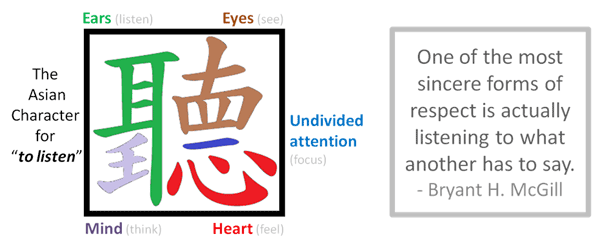R.E.S.PE.C.T, Find out what it means to me
“If once you forfeit the confidence of your fellow-citizens, you can never regain their respect and esteem.”
Abraham Lincoln (February 12, 1809 – April 15, 1865) was the 16th President of the United States.

Image by Edwin Lee
Ever gone to a car dealership where a smiling salesperson tried to steer you toward a purchase, with patronizing compliments and disingenuous interest in your life? I sure have. If you’re like me, you bristle a bit, and feel your intelligence being insulted. My wife calls it “being processed.”
Easily avoidable gaffs, such as the one above, are all too often made. Surprisingly, many experienced managers create such unwelcomed experience in the workplace and assume it will ‘motivate’ people. Probably the only person who would find motivation in these circumstances is Scott Adams, author of “Dilbert,” as it gives him plenty of good comic strip material.
I’ve witnessed a long list of gaffs in my career. Ever been acquainted with someone so valuable in a role that they were blocked from taking a job in another department? I’ve known several people who fit this category, and I’ve seen some quit to find their desired role elsewhere. Ever seen an “Employee Suggestion Program” rolled out with great fanfare, and then a year later wondered whatever happened to it? Or have you ever given up vacation hours because you weren’t given adequate coverage for your job (and worse yet, been criticized for not using all your vacation time)?
For a great many of us, our careers are a cornerstone of our lives, if not THE cornerstone. We are deeply invested in the success of the enterprise. So why is it so hard for some companies to “practice what they preach” in how they engage the needs of employees?
My experiences show people are predisposed to take pride in both their work on the overall organization, whether in day-to-day operations or during organizational changes. To that end, we work long hours, even stay connected after-hours. While companies benefit from such commitment levels, too often they only give platitudes in return such as “Work-Life Balance” without concrete support. Some firms still cling to rules once appropriate for a “9-to-5” world, not realizing they need to adapt to the realities of today.
Addressing your employees’ needs or values is not overly complex. Sandra Schwan shared the Gallup Engagement Hierarchy in her April 1 blog What Real Change Leaders Know: There’s No “I” in TEAM, But There is a ME. It is a simple, yet structured guide useful in assessing one’s work situation in terms of basic needs, management support, teamwork and personal growth. Employees should use this handy tool periodically for themselves, and for their direct reports.
Further Action:
I’m going to suggest thinking through the following list (that augments the Gallup list). Since “RESPECT” is a core enabler of employee work satisfaction, it serves as an apt acronym to provide structure for the list:
- Resource (impacts Group). Does your organization allow, enable and support Employee Resource Groups (ERGs)? Such groups provide a means for employees to connect with co-workers sharing a common interest, and, if run well, also serve to support the organization’s business goals.
Rest-&-relax (affects Individuals). When people go on vacation, do leaders support them with clearly defined and delegated job coverage rather than leaving it entirely to the individual, who often have no delegation authority?
- Exceptions (Group). Are workplace rules followed by everyone at all levels of the organization? Resentment occurs if leaders make exceptions for themselves.
- Suggestions (Individual). After employee suggestions are sought, is there adequate follow-through? If not, credibility will be lost. Certainly not all suggestions can or should be adopted, but each deserves a response.
- PEnny-wise and Pound Foolish (Group). Is your organization “penny-wise and pound foolish”? For example, does it put too much focus on little savings, such as not allowing motivated teams to buy pizzas for lunch meetings, while missing much larger savings opportunities?
- Career (Individual). Are employees encouraged and supported by their leaders to explore career options within the organization? Wanting a different or expanded role is not treasonous. If career discussions between leaders and their staff members are truly open, departures from a team are not a shock and succession planning can be well managed.
- Treatment (Group). Does the management team sometimes undermine one group to buy favor with another? It’s a myth to think this promotes healthy competition.
Treatment (Individual). Do levels of praise and reward from leadership fit the accomplishments? People know when they deserve accolades/rewards. Rewards backfire if managed with inconsistency (risking resentment among co-workers).
Respect and dedication from employees must be earned, not demanded. Employees are ready and willing to give both when treated fairly and honestly. A little common sense, focused on respecting your dedicated member’s needs and values, goes a long way in achieving strong employee engagement.
- Job Rotations: Overcoming Obstacles and Developing Staff to Their Full Potential - December 16, 2014
- Cornerstones of Leadership: Earning and Keeping Trust and Respect - October 29, 2014
- Give Your Team Leaders Authority and Support, Not Just Responsibility - August 5, 2014
- Program Management: Learning to Manage Up, Outward, Sideways and Down - July 22, 2014
- Personnel Development, a Cornerstone of Your Management Legacy - July 15, 2014
- R.E.S.PE.C.T, Find out what it means to me - April 22, 2014
- A Common Sense Approach to Performance Appraisals - February 25, 2014
- Walk a Mile in My Shoes (to build effective relationships) - January 21, 2014





